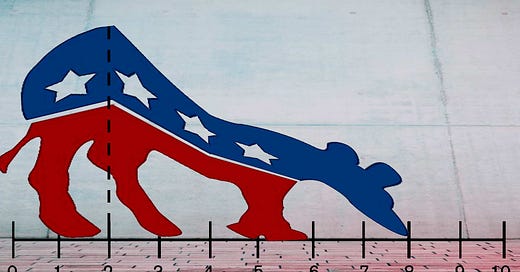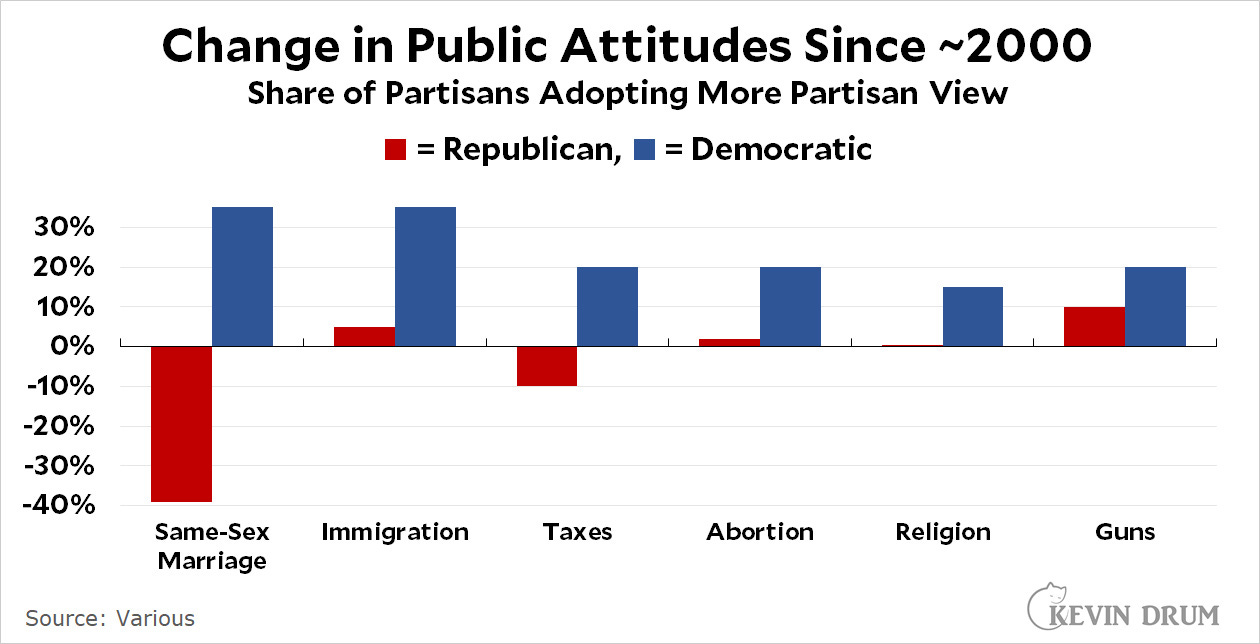Have Democrats Moved Way To the Left? If So, Is That Bad?
The answers, as usual, are “it’s not clear” and “it’s not clear”
I write a lot about the excesses of the left. The narrative that occupies much of my brain space these days is that the GOP spent the ‘90s and 2000s metaphorically shoving crayons up their noses until they were brain dead, and parts of the left are now following the same pattern. So, you might think that two posts from liberal blogger Kevin Drum that seem to validate at least the back half of that narrative would have me saying “ah-HAH! I KNEW it!”
To be clear: I am not above saying “I told you so." There are really no limits to how big of an asshole I’ll be when I think I’m right. I’ll always cloak my touchdown dance in academic language -- I’ll say something like “recent data confirm my earlier hypothesis,” but the message will be clear: “I was right, dickbags.”
Unfortunately, I don’t get to do that here. I think there are limits to what we can learn from Drum’s data. It’s still interesting stuff -- I highly encourage you to read both posts -- but to me, his posts are food for thought instead of a smoking gun. Sorry to be such a Nuance Queen.
Let me run through Drum’s argument. He looks at polling results on six issues: same-sex marriage, immigration, taxes, abortion, religion, and guns. In each case, the data go back to at least 2002, so Drum can track partisan changes over time. And what he finds is that Democrats have become more likely than Republicans to adopt the partisan position on these six issues:
Drum’s conclusion is provocative:
“It is not conservatives who have turned American politics into a culture war battle. It is liberals.”
My first problem with the data is the arbitrariness of the questions. Why these six issues? Obviously, you have to pick some issues, and no matter what you choose, some asshole (probably me) will say “why these six?”, but it’s worth considering that different topics might yield very different results. I’m a bit perplexed as to why taxes were chosen but race wasn't; if I was on The $25,000 Pyramid, and the category was “culture war issues”, the first word out of my mouth would be “race”. I’d don’t think I’d ever say “taxes” -- I think I’d probably say “come on, Vicki Lawrence, think for a fucking second” before I’d say “taxes” (in this hypothetical I’m on the ‘80s version of the Pyramid). I don’t think Drum is trying to engineer a result, but the topics he chooses have a huge impact on the data set.
My second problem is the arbitrariness of the timelines; the results can be significantly different if you shift the timeframes just a bit. Three categories (immigration, taxes, and gun laws) have an obvious Trump effect -- the fact that liberal support for immigration spiked in the late 2010s might have had something to do with the anti-immigrant demagogue who was separating families at the border. Also, the first year in the “taxes” polling was 2001, when we were all flush with Pets.com money and the Treasury was running a surplus. George W. Bush had campaigned on tax cuts (as well as a steadfast resistance to the temptations of fellatio), so it’s not surprising that 2001 saw the most extreme Republican response of any year to the “taxes” question. Using Drum’s technique of comparing the first year of data with the last year, Republicans moved away from the “partisan” position on taxes by 12 points. But if the beginning of the data set had been the very next data point of 2003, they would have moved towards the partisan position by ten points.
Which brings me to my third problem: Two of the questions -- taxes and guns -- measure attitudes relative to current laws. With guns, between the first data point and the last one, the assault weapons ban expired, the Supreme Court passed down the Heller decision, gun legislation suffered several high-profile defeats in Congress amidst a backdrop of horrific mass shootings, and the NRA basically became the 1990s Chicago Bulls of political activism. It’s possible that Democratic opinions on guns remained static as our gun laws became more permissive, but the survey would measure that as a leftward shift.
Finally, the polls measure attitudes of self-identified Republicans and Democrats. But are those the people who are “turning American politics into a culture war battle”? I’d argue no; I’d say it’s mostly politicians and media figures who are doing that (Tim Miller makes this case in detail here). There’s a structural reason why Republican politicians might be more extreme than their voters: Heavy gerrymandering means that most Republican House members represent districts where the only real threat is a primary challenge from the right, and the Senate and Electoral College over-represent conservative areas. Which suggests that this data might contain some good news: Many Republican voters might not be on board with, say, the clown car full of anti-vax lunacy that pulled up to CPAC this week.
Am I nit-picking? Maybe. But whether Drum is reaching conclusions not proven by the data or I’m simply being a first-order complexity fetishist, we seem to agree on a few key points:
The country has become more polarized
Electing Democrats leads to normatively-better outcomes for the country than electing Republicans
The “woke” brand of culture war activism is a swift path to electoral death for Democrats
The third point is the hot topic in Wonk World; here, Drum draws on the excellent work of David Shor, which outlines how hyper-intellectualized theories on social justice are pretty much the least-popular message Democrats could adopt short of “let’s euthanize Dolly Parton”. I’ve written about how I think some ideas in this school of thought are total garbage, and I agree that Democrats are about as likely to win elections using culture war messaging as The Charlie Daniels Band is to sweep the Latin Grammys.
But here’s where I have yet another conflict; here’s where I’ll cement my reputation as a subtlety slut of the highest order. A crude undercurrent of the story I’ve told so far is “left = bad”. But...I’m pretty far left. I would give the partisan Democrat answer to all six questions Drum examines, and also to at least nine of ten questions1 in a similar Pew survey. I don’t think that “left = bad” (and neither does Drum, and neither does Shor). So, if I’m constantly warning Democrats against moving too far left, but am also pretty far left, then...what the fuck am I even doing?
The answer isn’t as simple as “we need to be practical”. It is partly that -- I happen to be Captain Carbon Tax, but I know carbon taxes poll in kill-Dolly-Parton territory, so I’m not banging the drum for Democrats to run on carbon taxes. I accept that when my ideas aren’t in the Overton window, I need to temporarily swallow that loss and try to move the window in my direction.
I think the key point is that not all left-wing ideas are equally good. “We should create a national family leave program” is a left-wing idea, and “capitalists should be thrown into a bottomless pit” is, too. But they’re not the same. The first is a good idea that’s popular now, the second is a bad idea whose time will never come.
In my opinion, the far left has recently churned out bad ideas at a remarkable pace. Abolishing the police is a terrible idea. Cancelling all debt is a terrible idea. Modern Monetary Theory is a terrible idea. Attempting to engineer outcomes to match demographics is a terrible idea. The Green New Deal is a terrible idea; it’s a shame that it has such a great name. Not since 10,000 Maniacs has such an objectively-good name been wasted on such pointless garbage.
I have tolerance for popular, bad ideas -- sometimes you have to compromise in order to advance other goals. And I have patience for unpopular, good ideas (like a carbon tax!) -- those ideas might become popular with time. But there’s nothing to like about bad, unpopular ideas. And, if you believe that the activist left has recently been a wellspring of bad, unpopular ideas, then you’re likely to be made nervous by a leftward shift in Democratic politics, because you fear that the shift doesn’t represent a shift towards the “good” left. Leftward shifts are troubling if you think that a toxic strain of left-wing campus pseudo-intellectualism has escaped its beaker and is trying to infect the Democratic Party. And I do believe that - call it the “Social Science Lab Leak Theory”.
I think that progress always comes from the left; if you asked me “what separates left from right?”, I’d say “the extent to which a person wants change.” People on the left want change, people on the right want to keep things the same or even go backwards. It does not follow that every change the left seeks represents progress; history is full of really bad left-wing ideas. For the left to make progress in a democracy, we need to: 1) Come up with good ideas, and 2) Convince people that those ideas are good. My opinion is that the bratty activist class is currently derelict on both points. I favor a leftward shift in the Democratic Party if that shift represents a move towards workable ideas that either are popular now or might become popular in the near future.2 Drum’s analysis doesn’t convince me that the left has lost its way. But, given my opinions about the far left’s recent track record, I will admit that Drum’s charts elicit a loud, utterly-sincere Marge Simpson groan of concern from the depths of my soul.
“At least nine out of ten” because the question asking “do business corporations make too much profit?” is just gibberish to me. Do they make “too much?” Well, which “business corporations” are we talking about? If they’re making “too much”, then the market should be more competitive, so is that the fault of the business or the government? I punt on this question -- I’ll take the physical challenge, Marc.
If you’re thinking “like what?”, I’d say that the type of stuff in Biden’s American Families Plan and American Jobs Plan is a good start.





